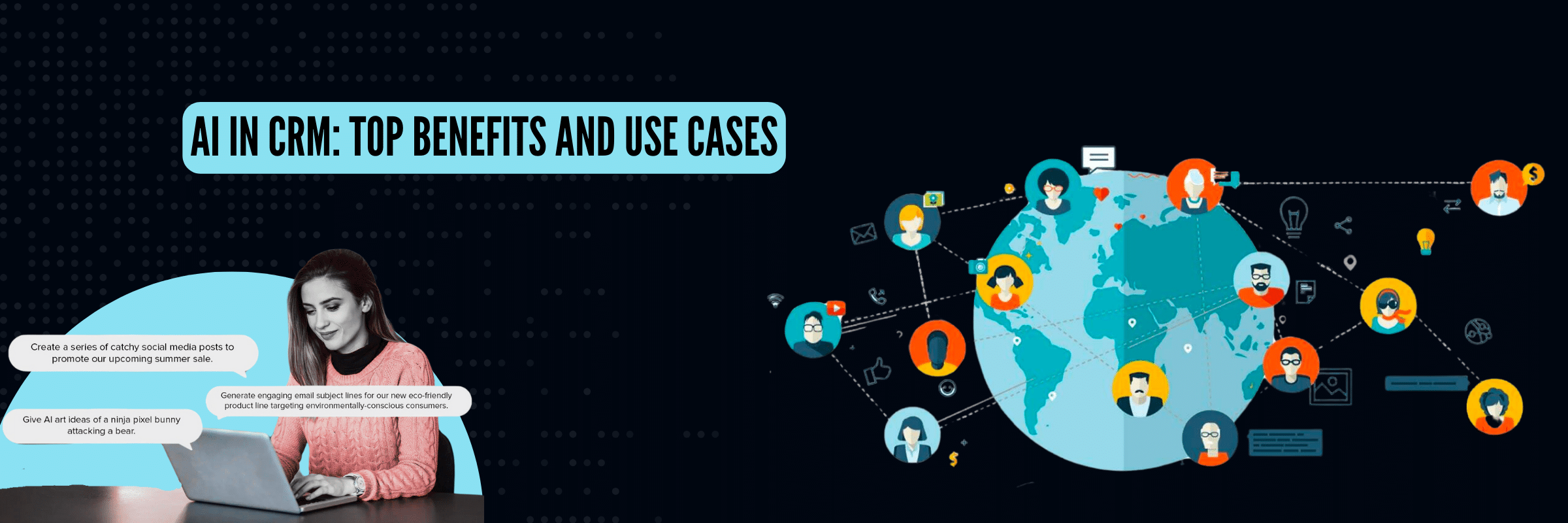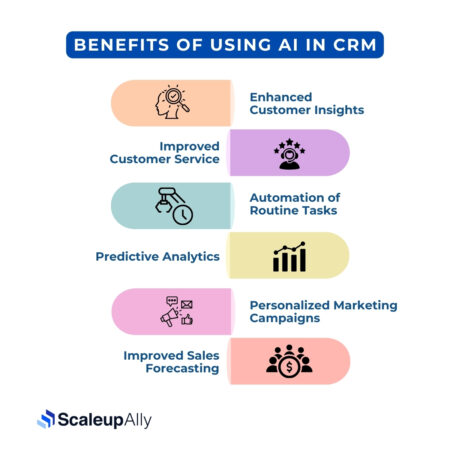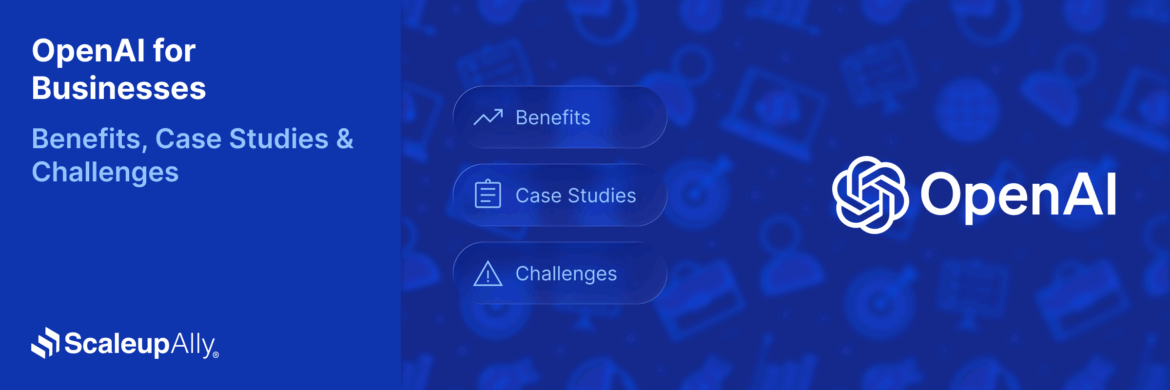
AI in CRM: Top Benefits and Use Cases
Manu Jain | May 15, 2024 , 16 min read
Table Of Content
Imagine sifting through endless spreadsheets, struggling to get meaningful insights, or manually categorizing customer interactions, only to miss crucial details that could enhance customer satisfaction. These challenges have long plagued businesses striving to deliver exceptional customer experiences.
However, with the inception of Artificial Intelligence (AI) this landscape is changing rapidly, offering a transformative solution that goes beyond the limitations of traditional CRM.
AI, with its ability to analyze vast amounts of data at incredible speeds, is revolutionizing how businesses interact with customers. By leveraging AI, businesses can now personalize customer interactions, predict future behavior, and automate routine tasks, all while gaining deeper insights into customer needs and preferences.
This article examines the top benefits and use cases of AI in CRM, showcasing how this technology is not only streamlining processes but also fostering stronger, more meaningful customer relationships.
Key Takeaways
- AI analyzes customer data to reveal behavior patterns, enabling smarter, data-driven business decisions.
- Automating routine tasks like data entry, lead scoring, and scheduling frees teams to focus on strategic priorities.
- Predictive analytics anticipates customer needs, uncovers upsell opportunities, and optimizes marketing and sales strategies.
- Personalized campaigns and tailored interactions boost engagement, satisfaction, and long-term loyalty.
- AI-powered chatbots and virtual assistants provide 24/7 support, while insights from feedback improve products, services, and decision-making.
What is AI in CRM?
- What is AI in CRM?
- Benefits of Using AI in CRM
- Top Use Cases of Leveraging Artificial Intelligence in CRM
- Real-World Examples of AI Boosting CRM Interactions
- Challenges in Incorporating AI in CRM Workflows
- Ethical Considerations To Keep In Mind
- ScaleupAlly: Your Partner for Implementing AI in CRM
- Conclusion
- Frequently Asked Questions (FAQs)
AI in CRM, or Artificial Intelligence in Customer Relationship Management, refers to the application of artificial intelligence technologies, such as machine learning, natural language processing, and predictive analytics, to manage and analyze customer data. AI in CRM enables businesses to gain deeper insights into customer behavior, automate tasks, personalize interactions, and improve overall customer satisfaction.
Using AI, CRM systems can process large volumes of data quickly and accurately, identifying patterns and trends that would be difficult or impossible to detect manually.
This enables businesses to make more informed decisions, tailor their marketing and sales strategies to individual customers, and provide better customer service.
Benefits of Using AI in CRM

Using AI in CRM offers a wide range of benefits for businesses looking to improve their customer relationships and drive growth. Some of the key benefits include:
1. Enhanced Customer Insights
AI enables businesses to analyze vast amounts of customer data to gain deeper insights into customer behavior, preferences, and trends. This information can be used to personalize marketing campaigns, tailor product offerings, and improve overall customer satisfaction.
2. Improved Customer Service
AI-powered chatbots and virtual assistants can provide immediate assistance to customers, answering common questions, resolving issues, and directing customers to the right resources. This can help businesses provide round-the-clock support and improve response times.
3. Automation of Routine Tasks
AI can automate repetitive tasks such as data entry, lead scoring, and scheduling, freeing up employees to focus on more strategic activities. This can improve productivity and efficiency within the organization.
4. Predictive Analytics
AI can analyze historical data to predict future customer behavior and trends. This can help businesses anticipate customer needs, identify upsell and cross-sell opportunities, and optimize marketing and sales strategies.
5. Personalized Marketing Campaigns
AI can analyze customer data to create personalized marketing campaigns tailored to individual preferences and behaviors. This can improve campaign effectiveness and drive higher conversion rates.
6. Improved Sales Forecasting
AI can analyze sales data to predict future sales trends and identify potential opportunities and risks. This can help businesses make more informed decisions and allocate resources more effectively.
Top Use Cases of Leveraging Artificial Intelligence in CRM
Here are some of the top use cases for leveraging Artificial Intelligence (AI) in CRM systems:
1. Improve Sales
Imagine a sales rep, John, who traditionally spends hours sifting through customer data to identify promising leads. He might sit on the data for hours only to come up with a handful of insights.
Now image using an AI-powered CRM that can analyze past sales data and customer interactions to:
- Score Leads: Assign a rating to leads based on their likelihood to convert, just like a spam filter rates emails. John can then prioritize high-scoring leads, like those showing interest in a specific product or attending multiple webinars.
- Predict Sales Trends: AI can analyze historical sales data to forecast future sales performance. This helps John’s manager allocate resources effectively, ensuring enough staff are on hand during peak sales periods.
2. Automate Repetitive Tasks for Efficiency
Data entry can be a real time consuming task. AI can automate basic tasks like:
- Data Entry: John scans a business card, and the CRM automatically populates the contact information with features like Optical Character Recognition (OCR).
- Schedule Meetings: John can set up parameters for his ideal meeting times, and the AI assistant in his CRM can automatically suggest times that work for both him and the client, eliminating the back-and-forth of email scheduling.
3. Deliver Personalized Customer Service
Imagine a customer, Sarah, reaches out to a company website with a question. An AI-powered chatbot can provide her with:
- Provide Instant Support: The chatbot can answer Sarah’s frequently asked questions (FAQs) 24/7, saving her time and allowing her to get answers without waiting on hold.
- Sentiment Analysis: The AI can analyze Sarah’s chat conversation to understand her frustration level and route her to a human agent if needed.
4. Gain Valuable Insights from Customer Interactions
- Analyze Customer Feedback: AI can analyze customer reviews, emails, and social media posts to understand customer sentiment. This can help identify areas for improvement or highlight positive trends about your product or service.
- Uncover Hidden Patterns: AI can analyze vast amounts of customer data to find hidden patterns and trends that humans might miss. For instance, it might identify a correlation between customer satisfaction and a specific product feature.
Real-World Examples of AI Boosting CRM Interactions
Here are some real-world examples of how companies are leveraging AI in their CRM systems to create a more personalized and efficient experience:
1. Amazon
Imagine browsing for a new book on Amazon. Their AI-powered recommendation engine analyzes your purchase history, browsing behavior, and even what books you’ve looked at but not bought. Using this data, Amazon recommends similar books you might be interested in, increasing the chances you’ll find something you love. This is a classic example of AI personalizing the customer journey.
2. Salesforce
Salesforce, a leading CRM provider, offers Einstein AI which acts as a virtual assistant for sales teams. Einstein analyzes data to identify high-potential leads, similar to how a spam filter prioritizes important emails. This allows sales reps to focus their efforts on the most promising leads, boosting their win rates.
3. Starbucks
The Starbucks mobile app leverages AI to personalize your coffee experience. Based on your past purchases and preferences, the app recommends new drinks or special offers you might enjoy. This not only increases customer engagement but also encourages you to try new things and potentially spend more.
4. Zia by Zoho
Zia is a virtual assistant built into Zoho CRM, another popular CRM platform. Zia understands natural language and can answer your questions about customer data or even complete tasks for you. For example, Zia can analyze a customer’s email and suggest a personalized response, saving reps valuable time.
These are just a few examples of how AI is being used to boost CRM interactions. As AI technology continues to evolve, we can expect to see even more innovative ways that companies personalize the customer experience and improve overall customer satisfaction.
Challenges in Incorporating AI in CRM Workflows
While AI offers so many benefits for CRM workflows, implementing it seamlessly comes with its challenges. Here are some key hurdles you might face:
1. Data Quality
AI algorithms are only as good as the data they’re trained on. Inaccurate, incomplete, or biased data can lead to skewed recommendations and unreliable predictions. Companies need to invest in data cleansing and quality control to ensure their AI-powered CRM is working with the best possible information.
2. Integration Headaches
Integrating AI with existing CRM systems can be a complex task. Older CRM platforms might not be designed to handle the demands of AI, requiring upgrades or workarounds. This can be a significant investment in time and resources.
3. Balancing AI and Human Expertise
While AI can automate tasks and provide valuable insights, it shouldn’t replace human interaction entirely. Customers still value the personal touch, and complex situations might require the judgment of a skilled sales rep or customer service agent. Finding the right balance between AI automation and human expertise is crucial.
4. Transparency and Bias
AI algorithms can perpetuate biases present in the data they’re trained on. This can lead to discriminatory outcomes, such as unfairly scoring certain leads as less likely to convert. Companies need to be transparent about their use of AI and implement safeguards to mitigate bias. Additionally, ensuring customer privacy and data security is paramount when using AI in CRM systems.
5. Upskilling Your Workforce
Integrating AI into workflows can be disruptive for some employees. Providing training and support can help your team understand how AI works and how to leverage it effectively. This can help minimize resistance and ensure a smooth transition.
Ethical Considerations To Keep In Mind
AI offers a powerful boost to CRM, but its implementation raises important ethical considerations. Here’s a breakdown of some key areas to keep in mind:
1. Bias and Fairness
- Data Bias: AI algorithms can inherit and amplify biases present in the data they’re trained on. This could lead to discriminatory outcomes, like unfairly scoring leads from certain demographics as less likely to convert.
- Mitigation Strategies: Regularly audit your training data for bias. Consider using diverse datasets and implement fairness checks to ensure AI-driven decisions are equitable.
2. Transparency and Explainability
- The Black Box Problem: Some AI models can be complex and opaque, making it difficult to understand how they arrive at decisions. This lack of transparency can erode trust and raise questions about accountability.
- Solutions: Strive for explainable AI (XAI) models that provide insights into their reasoning. This can help users understand AI recommendations and build trust in the system.
3. Privacy and Security
- Customer Data Concerns: CRM systems house a wealth of customer data. Leveraging AI requires careful handling of this data to ensure privacy and security.
- Best Practices: Implement strong data security measures like encryption and access control. Obtain clear customer consent for AI-powered data analysis and be transparent about how their data is used.
4. Human Control and Accountability
- Who’s in Charge? While AI automates tasks and offers insights, human oversight remains crucial. Ensure clear lines of responsibility for AI-driven decisions, especially for critical workflows.
- Human Oversight: Don’t let AI replace human judgment entirely. Complex situations or customer interactions may still require the nuance and empathy of a human touch.
5. Societal Impact
- Job displacement: AI automation may lead to job losses in certain areas of CRM, like data entry or customer service. Consider retraining programs and mitigation strategies to support impacted employees.
- Ethical AI Development: Be mindful of the broader societal implications of AI. Develop and deploy AI in a way that benefits society as a whole, not just your bottom line.
ScaleupAlly: Your Partner for Implementing AI in CRM
Implementing AI in CRM can be complex, but with the right partner, the process becomes seamless and highly effective. ScaleupAlly can be your ultimate partner for implementing AI in CRM.
Here are just a few reasons as to why you should choose ScaleupAlly:
1. Expertise in AI and CRM Integration
ScaleupAlly boasts a team of over 50 mobile engineers with deep expertise in AI and CRM systems. Our team is well-versed in the latest AI technologies, including machine learning, natural language processing, and predictive analytics. We understand the nuances of integrating these advanced technologies into CRM platforms, ensuring that your business can fully leverage the power of AI to enhance customer relationships.
2. Customized Solutions
We recognize that every business is unique, with its own set of challenges and goals. At ScaleupAlly, we don’t believe in one-size-fits-all solutions. Instead, we work closely with you to understand your specific needs and tailor our AI integration strategies accordingly. Whether you are looking to automate routine tasks, gain deeper customer insights, or personalize customer interactions, we design customized generative AI solutions that align perfectly with your business objectives.
3. Seamless Implementation
Implementing AI in CRM can be daunting, but with ScaleupAlly, you can rest assured that the process will be smooth and efficient. Our experienced team follows a structured approach to integration, from initial assessment and planning to deployment and ongoing support. We ensure minimal disruption to your existing operations while maximizing the benefits of AI-enhanced CRM.
Get Started with ScaleupAlly
Implementing AI in CRM is a game-changer for businesses looking to stay competitive and customer-centric. With ScaleupAlly as your partner, you gain access to expertise, customized solutions, and seamless implementation. Transform your CRM system into a powerful tool that drives customer satisfaction and business growth.
Contact ScaleupAlly today to learn how we can help you harness the power of AI in your CRM system and take your customer relationship management to the next level.
Conclusion
The future of CRM is undeniably intertwined with AI. By embracing AI in your CRM strategy, you’re not just implementing a new technology; you’re investing in a transformative shift in how you connect with your customers. AI can empower you to personalize interactions, anticipate customer needs, and streamline workflows, ultimately fostering stronger customer relationships and loyalty.
The potential benefits of AI-powered CRM are vast, and the specific applications can be tailored to your unique business goals. Whether you’re looking to boost sales conversion rates, enhance customer service experiences, or gain deeper insights into customer behavior, AI can be your secret weapon.
Don’t wait to explore the possibilities of AI-powered CRM. Take the first step by researching solutions that align with your specific needs. The power to build stronger customer relationships and unlock exceptional business growth is within your reach. Partner with the right AI solution provider, and watch your CRM transform from a data repository to a dynamic engine for customer engagement and success.
Frequently Asked Questions (FAQs)
Q: How can I measure the ROI of AI in CRM?
Measuring the ROI of AI in CRM involves evaluating both quantitative and qualitative metrics. Key performance indicators (KPIs) to consider include:
- Customer Acquisition Cost (CAC): Track how AI-driven insights and automation reduce the cost of acquiring new customers.
- Customer Lifetime Value (CLV): Assess how personalized marketing and improved customer service increase the long-term value of your customers.
- Sales Conversion Rates: Monitor changes in lead-to-customer conversion rates due to AI-enhanced lead scoring and predictive analytics.
- Operational Efficiency: Calculate savings from automating routine tasks, reducing manual errors, and optimizing workflows.
- Customer Satisfaction (CSAT) and Net Promoter Score (NPS): Measure improvements in customer satisfaction and loyalty through surveys and feedback mechanisms.
Q: Is using AI in CRM affordable for small businesses?
Yes, using AI in CRM is increasingly affordable for small businesses. Many CRM platforms offer scalable AI features that can be customized to fit different budgets and needs. Additionally, cloud-based CRM solutions often provide AI capabilities on a subscription basis, reducing the need for significant upfront investment. Small businesses can start with basic AI functionalities, such as chatbots and automated email marketing, and gradually expand their use of AI as they see returns and grow their operations.
Q: Can AI replace CRM administrators or salespeople?
AI is not designed to replace CRM administrators or salespeople but to augment their capabilities. AI can handle repetitive and time-consuming tasks, such as data entry, lead scoring, and scheduling, freeing up CRM administrators and salespeople to focus on higher-value activities. For CRM administrators, AI can provide insights and automation tools to streamline workflows and improve data accuracy. For salespeople, AI can offer predictive analytics and personalized recommendations to enhance their sales strategies and improve customer interactions. AI serves as a powerful assistant, enabling human professionals to be more productive, strategic, and effective in their roles.
Q: Is implementing AI in CRM secure?
Yes, implementing AI in CRM can be secure with the right measures. Ensure data encryption for protection in transit and at rest. Use strict access controls to limit data access to authorized personnel only. Conduct regular security audits and vulnerability assessments. Comply with data protection regulations like GDPR, CCPA, and HIPAA. Implement robust security protocols to protect AI models from tampering. Maintain transparent privacy policies to inform customers about data collection and use. By following these steps, you can secure your AI-powered CRM system.
Q: What tech stack should I use for an AI-based CRM?
For an AI-based CRM, use a combination of these technologies:
- CRM Platforms: Salesforce, HubSpot, or Microsoft Dynamics 365 for built-in AI features.
- AI and Machine Learning Frameworks: TensorFlow, PyTorch, or Scikit-learn for building AI models.
- Data Processing and Storage: Apache Hadoop, Apache Spark, or Amazon S3 for handling large data sets.
- Natural Language Processing (NLP): spaCy or NLTK for text data analysis.
- Database Management: MySQL, PostgreSQL, or MongoDB for data storage.
- Data Visualization: Tableau or Power BI for creating interactive dashboards.
- APIs and Integrations: RESTful APIs or GraphQL for seamless data exchange.
This tech stack will help you build a robust AI-based CRM system that enhances efficiency and customer insights.
Related Blogs

OpenAI for Businesses [Benefits, Use Cases & Challenges]
Discover the benefits of OpenAI for businesses. From reducing costs to scaling operations and enriching customer experiences. Real-world use cases included.
ScaleupAlly Team
Dec 16 ,
11 min read

Best 11 Agentic AI Tools in UAE: Accelerating Digital Transformation
Discover the top 11 agentic AI tools in UAE for 2025. Explore features, benefits, and tips to choose the right AI tool for your business growth.
Manu Jain
Nov 6 ,
9 min read

How to Choose an AI Development Company in Dubai: A Complete Guide
Find out how to choose the right AI development company in Dubai. Learn key factors, local considerations, and tips to select the best partner.
Manu Jain
Nov 6 ,
9 min read


